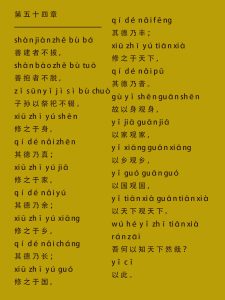Tao Te Ching Chapter 54

1. Classical Chinese Original
善建者不拔,善抱者不脱,子孙以祭祀不辍。
修之于身,其德乃真;
修之于家,其德乃余;
修之于乡,其德乃长;
修之于邦,其德乃丰;
修之于天下,其德乃普。
故以身观身,以家观家,以乡观乡,以邦观邦,以天下观天下。
吾何以知天下然哉?以此。
2. Pinyin Transcription
Shàn jiàn zhě bù bá, shàn bào zhě bù tuō, zǐsūn yǐ jìsì bù chuò.
Xiū zhī yú shēn, qí dé nǎi zhēn;
Xiū zhī yú jiā, qí dé nǎi yú;
Xiū zhī yú xiāng, qí dé nǎi zhǎng;
Xiū zhī yú bāng, qí dé nǎi fēng;
Xiū zhī yú tiānxià, qí dé nǎi pǔ.
Gù yǐ shēn guān shēn, yǐ jiā guān jiā, yǐ xiāng guān xiāng, yǐ bāng guān bāng, yǐ tiānxià guān tiānxià.
Wú hé yǐ zhī tiānxià rán zāi? Yǐ cǐ.
3. Structural Analysis
Section 1: The Art of Sustainable Practice
- Two Masteries:
- “Good builders create what cannot be uprooted”
- “Good holders grasp what cannot slip away”
- Legacy: “Descendants continue ancestral rites without end”
Section 2: Five Levels of Cultivation
- Personal: “Cultivated in self → virtue becomes authentic”
- Household: “Cultivated in family → virtue overflows”
- Community: “Cultivated in village → virtue endures”
- Nation: “Cultivated in state → virtue flourishes”
- World: “Cultivated universally → virtue becomes pervasive”
Section 3: The Observation Method
- Holistic Assessment:
“Understand individuals through individuals, families through families… worlds through worlds” - Epistemology:
“How do I know the world’s condition? By this method.”
4. Key Concepts
| Chinese | Pinyin | English | Philosophical Meaning |
|---|---|---|---|
| 善建 | shàn jiàn | Skillful building | Creating lasting foundations |
| 德普 | dé pǔ | Pervasive virtue | Universal moral influence |
| 以此 | yǐ cǐ | By this method | Empirical observation principle |
| 不辍 | bù chuò | Without cessation | Eternal continuity |
5. Comparative Commentary
- Confucian Parallel: Similar to 修身齐家治国平天下
- Systems Theory: Fractal self-similarity across scales
- Leadership Studies: Authenticity at personal level enabling broader impact
6. Plain-English Summary
This chapter presents:
- True Mastery: Creating unshakable foundations
- Virtue Expansion:
- Personal → Family → Community → Nation → World
- Each level builds on the former
- Assessment Principle:
- Understand systems by their own standards
- No universal template
